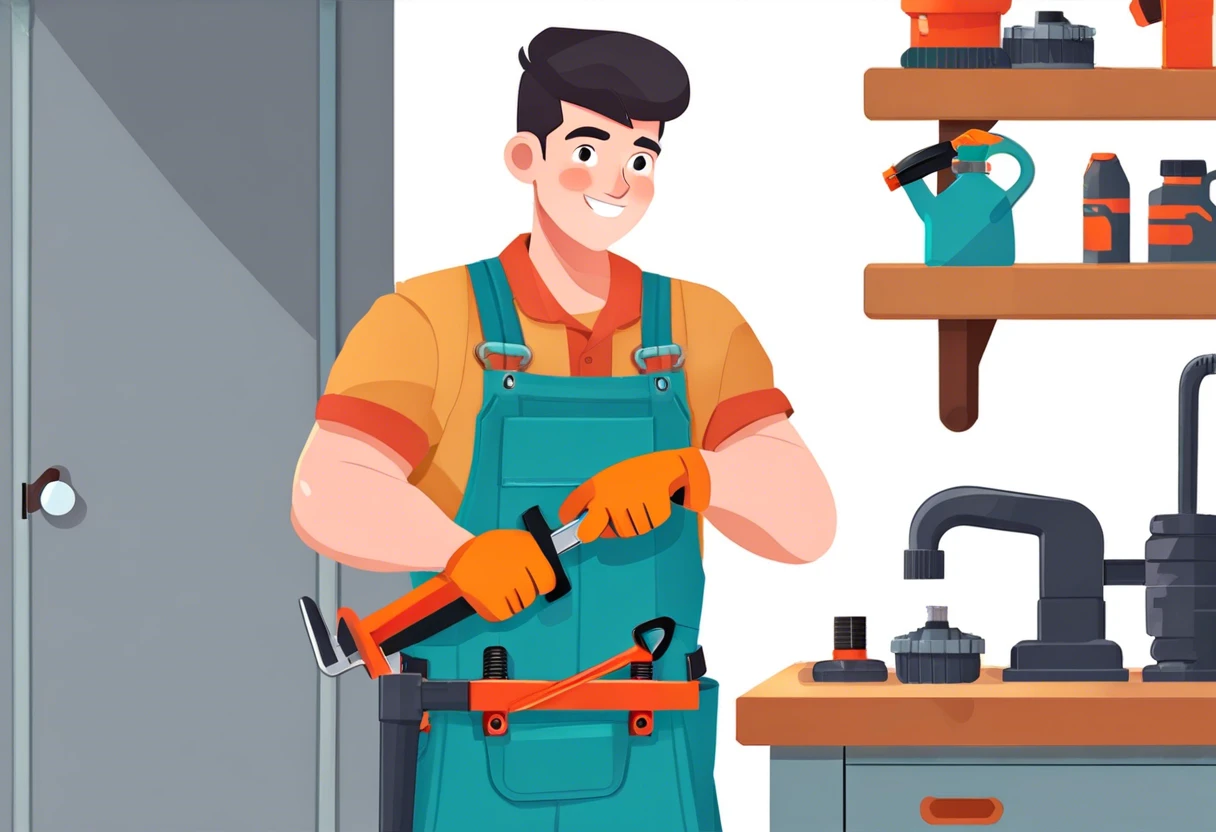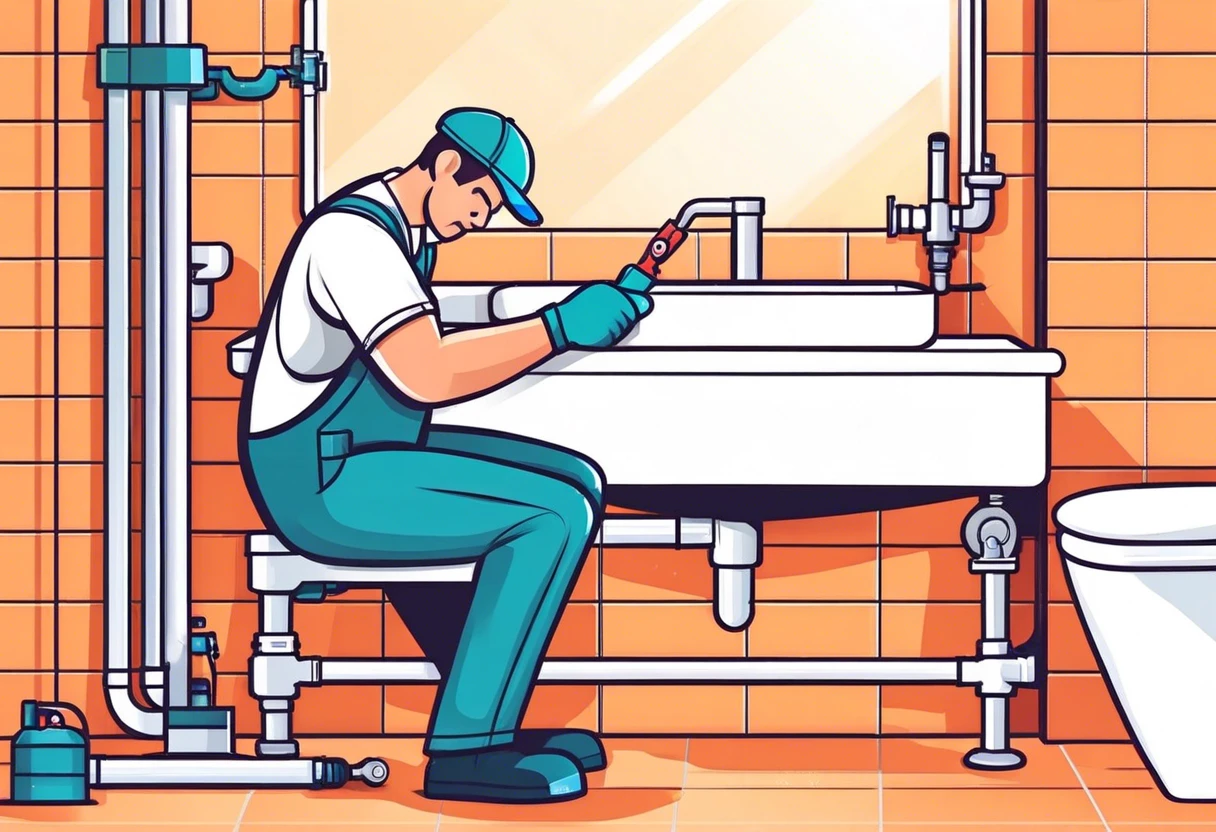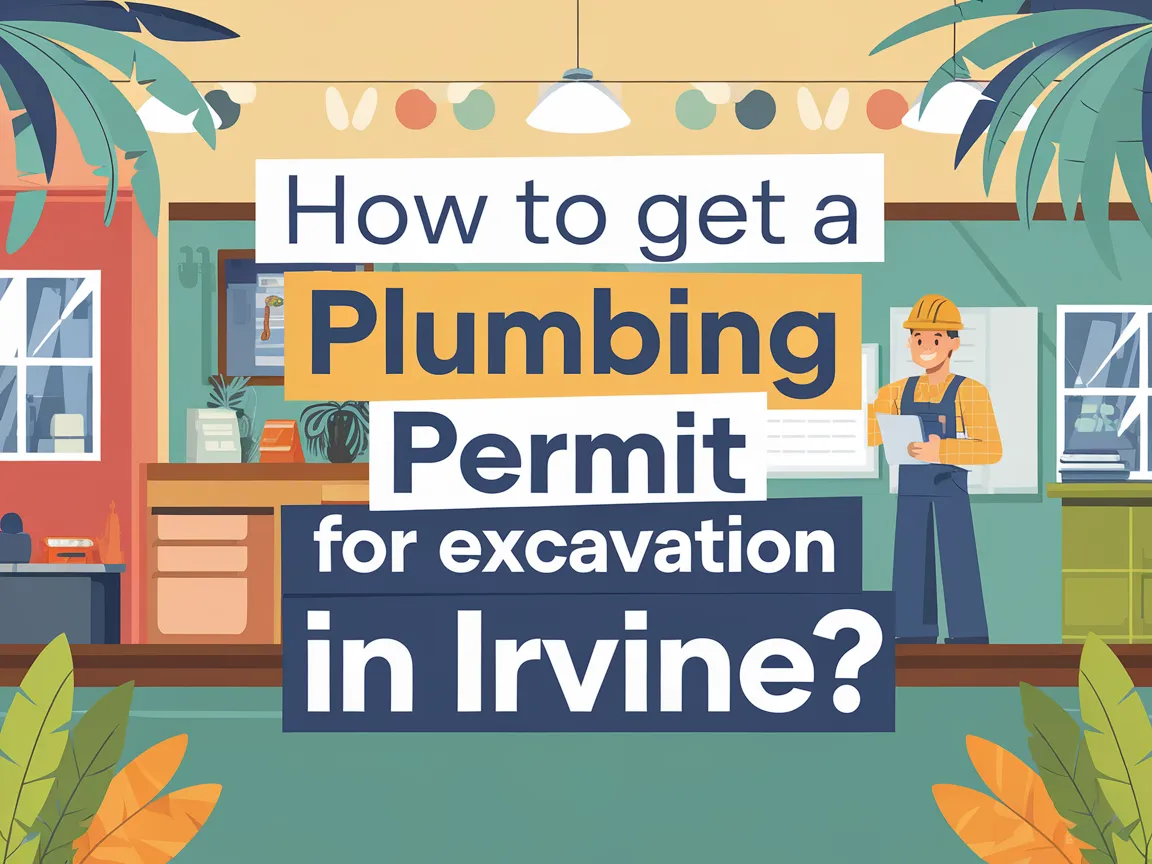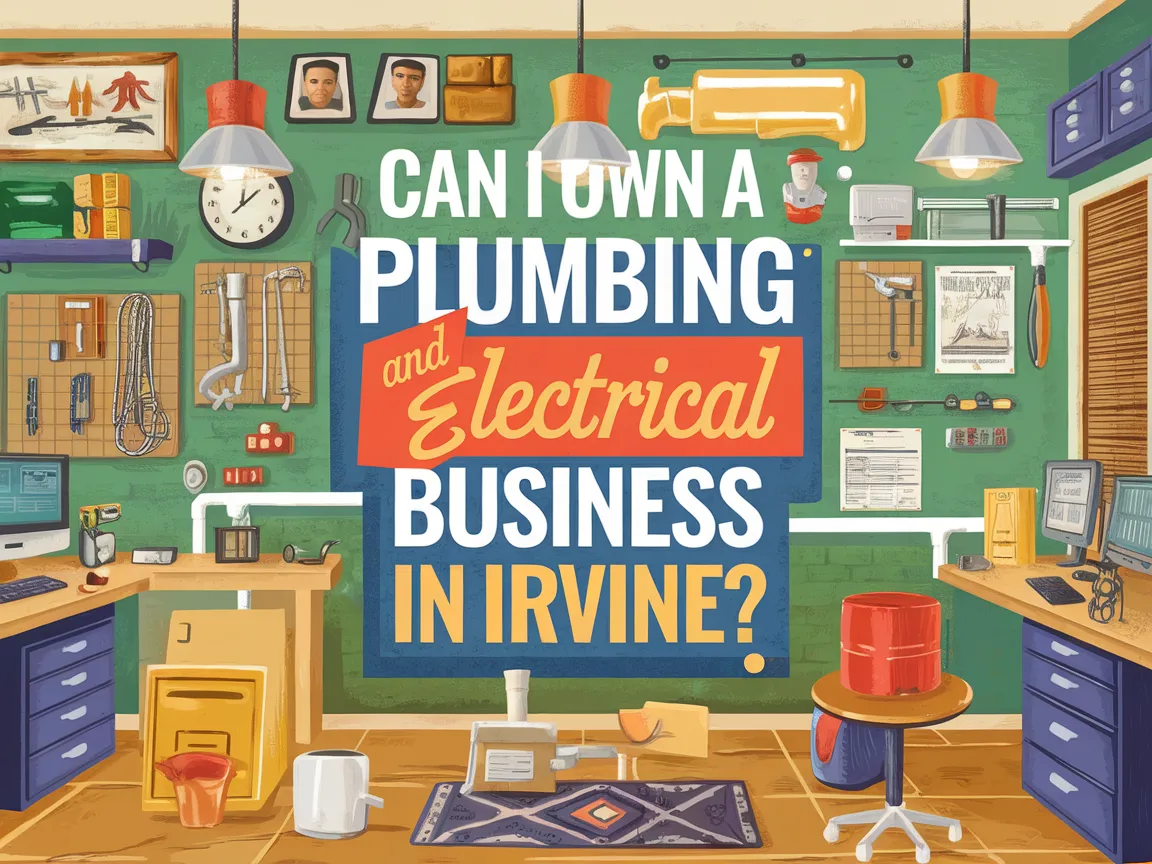How Long It Takes to Become a Plumber?
Last Updated: February 27, 2025
A plumber is a skilled person who fixes pipes and water systems in your house. They help make sure your water flows and drains properly, like making your bathtub work!
One of the top questions I get from DIY enthusiasts is how long it takes to become a plumber. Based on my firsthand experience, I’m here to break it down and help you understand the steps you’ll need to take.
This guide will cover key aspects like what being a plumber means, important steps to start your plumbing journey, costs involved, factors that affect your timeline, and special tips for aspiring plumbers in Irvine.
Table of Contents
- How Long It Takes to Become a Plumber?
- What is a Plumber?
- Before You Start Your Journey to Becoming a Plumber…
- How to Become a Plumber
- How Much Does It Cost to Become a Plumber?
- What Are the Factors Affecting the Time to Become a Plumber?
- Career Advancement Opportunities in Plumbing
- Timeframe for Certifications and Specializations
- Timeframe for Apprenticeship Programs in Plumbing
- Lessons Learned From Real Plumbing Apprenticeships
- Networking and Joining Professional Associations
- Special Considerations for Aspiring Plumbers in Irvine
- DIY Plumbing Fixes You Can Handle
- When to Call for Backup
- Frequently Asked Questions
- Final Thoughts on Becoming a Plumber
- Useful References
How Long It Takes to Become a Plumber?
Becoming a plumber typically takes 4-5 years, including a mix of apprenticeships and classroom education. Most start as apprentices for about 2-4 years. After finishing, you usually become a licensed plumber. It’s a solid path to stoked job opportunities in the OC!
What is a Plumber?
A plumber is a skilled tradesperson specializing in the installation, maintenance, and repair of piping systems that handle water, sewage, and natural gas. In California, these heroes make sure our taps flow freely and our toilets flush properly. They work with various materials, like copper and PVC (Polyvinyl Chloride), while adhering to the California Plumbing Code, which outlines everything from water pressure standards (Generally Between 40 to 60 Psi) to safety measures for connected fittings. You might be surprised to learn there are around 26,000 licensed plumbers in California alone. Professional plumbers carefully plan their daily work schedules to maximize efficiency and ensure timely service for their clients.
I remember calling a local plumber named Mike when my kitchen sink got clogged—he was prompt and super skilled, and I was back in business that afternoon. But let’s talk about how long it takes to become a plumber. For most, it involves two years of education and about 2,000 hours of hands-on experience as an apprentice. The average plumber’s salary in California is hella good too, coming in at about $58,000 per year or more, especially when approaching expert levels or if you decide to go into specialized fields like union jobs or emergency plumbing.
Before You Start Your Journey to Becoming a Plumber…
What do you need to prepare for?
- Plumbing Toolkit: You need a toolkit, like the DEWALT Mechanics Tools Kit. It’s essential for handling various plumbing repairs and installations efficiently.
- Plumbing Code Book: Get the California Plumbing Code book. This will ensure you’re following legal guidelines and staying updated with all local regulations and standards.
- Certification Fees: Be ready with about $150 for upcoming certification exams. These fees are necessary to advance your training and skills.
- Safety Gear: Invest in quality safety gear, such as ECVIVAL safety glasses and gloves. Safety is crucial when you’re working with tools and potentially harmful materials.
You should now have a good understanding of the steps to take before starting your plumbing career. In the next part, we’ll discuss how to become a plumber.
Also See: What Plumbing Pipe is Used in Houses in Irvine?

How to Become a Plumber
Let’s dive into the steps on how long it takes to become a plumber for a successful career in the construction industry—all right here in beautiful Irvine, CA and nearby areas. When planning your plumbing career path, you’ll want to explore the technical nuances of professional installations, including specialized components like reducer fittings in plumbing systems.
-
Research Plumbing Requirements
Start by checking out the local plumbing requirements, regulations, and job openings in the Irvine area. This will help you understand what licenses you need to get and what’s hot in the market. If you’re wondering about specific plumbing responsibilities in residential communities, HOA plumbing coverage matters can significantly impact your professional knowledge.
As someone who’s been knee-deep in plumbing for years, I can tell you that spending time on the California Department of Consumer Affairs website is totally worth it for industry-specific guidelines and deadlines.
-
Pursue a High School Diploma or Equivalent
Make sure you’ve got a high school diploma or equivalent (Like a GED) to meet the educational requirements. Subjects like ESL, math, and science are super important—you’ll want to pay extra attention to those for the technical stuff later on.
Finish these studies within 4 years to lay the groundwork for further educational options. A solid foundation makes a huge difference, especially when many pathways lead to community colleges or apprenticeships.
-
Enroll in a Plumbing Program
Look for plumbing programs that usually run from 6 months to 2 years. Community colleges around the OC area, like Orange Coast College, offer accredited plumbing courses you should definitely consider for hands-on learning. If you want to dive deeper into technical terminology like VTR in plumbing, professional resources can clarify complex concepts.
While you’re there, don’t skip out on essential subjects like installation techniques, codes, and safety. The more you hustle now, the better you’ll do down the road—jobs in plumbing need a solid understanding of various plumbing basics and DIY skills!
-
Complete an Apprenticeship
Find an apprenticeship to gain valuable on-the-job experience—usually lasting 4 to 5 years. Enrolling through organizations like the United Association or local trade unions can connect you with a skilled plumber. When exploring plumbing career paths, you might encounter specialized components like plumbing risers in technical training.
Active participation in an apprenticeship lets you sharpen your skills while earning stipends. Aim to cover as many learning scenarios as possible, from pipework and plumbing functions to advanced installations.
-
Obtain Your License
Wrap up your coursework and training to get your plumber’s license—this varies by state but won’t take longer than about six months after you’ve nailed the necessary fundamentals. This process often includes passing an exam that lasts under 2 hours, covering essential plumbing codes and laws, ensuring everything aligns with local norms. If you’re ready to dive deeper into professional plumbing techniques, professional plumbing techniques can help.
Once you’re licensed, you’re free to freelance your plumbing skills or search for stable positions, with salaries ranging from $45,000 to $80,000 a year depending on your skill level and specialty. Testing for endorsements, like a master plumber or similar specialties, boosts your credibility and earnings potential in the amazing California market!
Pro Tip: Stay in touch with local plumbing associations—it can help you build crucial networking relationships as you progress in your plumbing career.
You should now have a good understanding of the steps to become a plumber. In the next part, we’ll discuss the costs involved.
How Much Does It Cost to Become a Plumber?
To become a plumber, you’ll generally spend anywhere from $1,500 to $15,000, depending on the route you take. Trade schools might charge between $5,000 and $15,000 for a program, while community colleges might be as low as $1,500. In my experience, it’s always smart to factor in unexpected costs like tools and licensing fees. Budgeting around $3,000 to $5,000 makes sense as you work toward your plumbing career—which typically takes about 2-4 years to get fully licensed. If you’re curious about specific technical aspects of plumbing training, CTS systems play a crucial role.
Cost Breakdown for Becoming a Plumber
| Cost Item | Low Estimate | High Estimate |
|---|---|---|
| Trade School Tuition | $5,000 | $15,000 |
| Community College Tuition | $1,500 | $3,000 |
| Tools and Equipment | $300 | $1,000 |
| Licensing Fees | $50 | $300 |
| Insurance (First Year) | $400 | $1,000 |
We’ve wrapped up the costs associated with becoming a plumber. Let us turn our attention to the factors influencing the time required for training.
What Are the Factors Affecting the Time to Become a Plumber?
So, what factors impact the duration to enter the plumbing trade?
-
Apprenticeship duration. The length differs between states, usually 4 to 5 years in Cali.
-
Training programs. Vocational programs can reduce entry time significantly, saving you months of training.
-
Certification exams. Passing relevant state exams adds time to your entry process, typically several months.
-
Previous experience. If you’ve worked in related fields, you might speed up your training timeline by up to a year.
So far we covered the factors that influence the duration to become a plumber. Let’s look at career growth options in plumbing next.

Career Advancement Opportunities in Plumbing
Once you’ve completed your training, there are various ways to level up your plumbing career, making it worth your while!
- Specializations: Focusing on areas like gas fitting, drain cleaning, or backflow prevention can enhance your skills and income potential.
- Master Plumber License: After a few years of experience, you can pursue a Master Plumber License, which opens up high-paying positions or allows you to run your own business.
- Teaching Opportunities: With sufficient experience, you could even head back to community colleges or trade schools in the OC to teach aspiring plumbers.
- Contracting Work: As a licensed plumber, jumping into contracting work can provide flexibility and higher earnings if you hustle.
Timeframe for Certifications and Specializations
Here’s a breakdown of different plumbing certifications and their respective timelines, helping you plan your career path effectively!
| Certification/Specialization | Timeframe (Months) | Potential Earnings Increase (%) |
|---|---|---|
| Backflow Prevention Certification | 3-6 | 10-20% |
| Gas Fitting License | 6-12 | 15-25% |
| Master Plumber License | 12-24 | 30-50% |
| HVAC Certification | 6-12 | 10-30% |
Timeframe for Apprenticeship Programs in Plumbing
Apprenticeships are a crucial step in your plumbing journey, and the timeline can vary significantly based on several factors.
| Apprenticeship Program Type | Typical Duration (Years) | Hands-on Experience (Hours) |
|---|---|---|
| Union Apprenticeships | 4-5 | 8,000 |
| Non-union Apprenticeships | 3-4 | 6,000 |
| Community College Programs | 2-3 | 4,000 |
Lessons Learned From Real Plumbing Apprenticeships
Real-world experience can shape your learning. Here are some lessons I’ve seen firsthand from apprentices in Irvine:
- On-the-Job Training: Many apprentices realize that most learning comes from real-world scenarios, from repairs to installations. Hands-on practice is invaluable.
- Networking: Joining a reputable apprenticeship program helps you meet seasoned pros who often offer mentorship opportunities.
- Time Management: Balancing work with training can be tough, but it’s key—prioritize your tasks to make the most of both.
- Understanding Local Codes: Learning about California’s plumbing codes during your apprenticeship gives you a distinct advantage. It’s crucial for compliance!
Networking and Joining Professional Associations
Networking can be a game-changer in your plumbing career! Joining associations can lead to potential job opportunities and knowledge sharing.
- Local Plumber’s Union: Great for networking, access to apprenticeship programs, and job listings.
- National Association of Plumbing Contractors (NAPC): Offers resources and networking events to boost your career.
- Plumbing-Heating-Cooling Contractors Association (PHCC): Provides education resources and potential job listings, perfect for getting ahead in your field.
Special Considerations for Aspiring Plumbers in Irvine
This section covers unique technical factors you need to know on your path to plumbing success right here in sunny California.
- Licensing Requirements: In California, you need over 8,000 hours (Or About 4 Years) of hands-on experience under a licensed plumber to qualify for a plumbing license.
- Continuing Education: After you get your license, California law requires 16 hours (0.75 Days) of continuing education every 2 years for renewal. This keeps you updated with the latest codes.
- Permitting: Before starting any plumbing project, you’ll often need to secure permits. Costs can range from $50 to $200 (USD) depending on the project’s scope and local city regulations.
- Tools and Certification: Investing in quality tools can cost between $500 and $2,500 (USD). Plus, consider getting certified in areas like backflow prevention; it’s definitely a plus.
- Plumbing Codes: Familiarize yourself with local codes, like the California Plumbing Code. For instance, you’ll start applying standards for toilet heights and the specific fitting orders for angle installations at a level of 80 inches (203.2 Cm) above the finish floor.
DIY Plumbing Fixes You Can Handle
If you’re feeling a bit adventurous, you might want to give some DIY fixes a go. Replacing a toilet flapper is one of those simple tasks that you can learn in no time. Seriously, you can do it in under 30 minutes, and it’ll save you a few bucks on that water bill. Trust me, the satisfaction of fixing it yourself is priceless!
And don’t forget about checking your water pressure! If your showers feel less like a refreshing waterfall and more like a drizzle, it’s worth checking out. A pressure gauge is inexpensive and easy to use, making it a great tool for any homeowner.
When to Call for Backup
But hey, if it all seems too much, or if you’re faced with a major issue like a burst pipe—don’t hesitate. Seriously, those can cause hella damage if not dealt with quickly! Call in a pro; your peace of mind is worth it.
And remember, I’m always stoked to help a fellow homeowner in Irvine. Whether you want to chat about fixes or just need a tip, reach out anytime!
Also See: What is CTS in Plumbing? Learn Its Benefits
Frequently Asked Questions
How Fast Can You Become a Plumber?
How fast can you become a plumber? You can typically become a plumber within 4-5 years when you include training and on-the-job experience. Many folks in Irvine start with vocational school and jump into apprenticeships that last about 4 years, so you’re looking at a solid timeline.
How Long Does It Take to Learn Basic Plumbing?
How long does it take to learn basic plumbing? Generally, you can pick up foundational plumbing skills in a few weeks at a trade school or community college. These programs often get you started on weekends, allowing you to learn quickly while balancing life in sunny California. If you’re curious about specific plumbing techniques and municipal regulations, professional plumbers recommend researching local guidelines.
Can You Make $100,000 As a Plumber?
Can you make $100,000 as a plumber? Absolutely, especially with experience and specialty licenses! Plumbers in premium markets like Irvine can snag well over that, particularly if they tackle emergency repairs or high-end installations, sometimes topping out around $120,000 annually. If you’re curious about the potential costs of plumbing for new house construction, plumbing expenses in Irvine can provide valuable context for your career planning.
What Are the Qualifications Needed to Become a Plumber?
What are the qualifications needed to become a plumber? You’ll usually need a high school diploma or GED, combined with a plumbing apprenticeship, which can take around 4 years. Getting at least one license takes commitment but really pays off here in the OC. When navigating complex plumbing systems, professionals often rely on specialized techniques like wet vent plumbing configurations.
What Skills Are Critical for Successful Plumbers?
What skills are critical for successful plumbers? Strong problem-solving and hands-on skills are a must. You’re dealing with complex installs and troubleshooting daily, and having that knack can really set you apart once you hit the field in places like the valley. If you’re curious about the journey to becoming a professional plumber, check out the path to plumbing expertise.
Final Thoughts on Becoming a Plumber
I hope this was worth your while as we covered the various steps in becoming a plumber, including what defines a plumber, necessary preparations, the journey to certification, costs involved, time factors, specific considerations for Irvine, signs to seek expert services, and common plumbing issues homeowners face in our city.
These insights, gathered from countless jobs here in Irvine, should be helpful for your home maintenance. Typically, it takes a few months to several years to become a plumber based on your chosen path. For all your plumbing needs, don’t hesitate to explore our services.
To stay informed about the latest updates and articles, feel free to return to our homepage at Irvine Plumbers.
Useful References
- Orange County Plumbing Association (OCPA) – https://www.ocplumbing.org
- How to Become a Plumber | 5 Steps to Follow | Faraday
- How Long Does It Take to Become a Plumber? – FieldEdge
- How long does it take to become a professional plumber? – Quora


